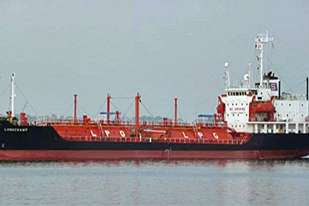 The German military said there were two more suspected hijack attempts by pirates on Thursday
The German military said there were two more suspected hijack attempts by pirates on ThursdaySomali pirates have hijacked a German-owned tanker carrying liquefied petroleum gas (LPG) in the Gulf of Aden, a maritime officials said.
"The MV Longchamp was hijacked this morning with a crew of 13 - twelve Filipinos and one Indonesian," Andrew Mwangura of the East African Seafarers Assistance Programme said on Thursday.
It was not clear where the tanker, which was flying the Bahamas flag, was headed.
The tanker has a capacity of 3,415 tonnes, Mwangura said.
Piracy havoc
Pirates have been causing havoc in one of the world's busiest shipping lanes, hijacking dozens of ships last year and demanding tens of millions of dollars in ransom payments.
Hamburg-based ship operator Bernard Schulte Shipmanagement confirmed the hijacking. It said no ransom demands had been made.
"The master was briefly allowed to communicate with us and it appears that all crew members are safe," it said in a statement.
Piracy in the Gulf of Aden has prompted some shipping firms to take an alternative route via South Africa instead of via the Suez Canal.
The alternative shipping route has lowered the frequency of hijackings, but there have still been three boats captured this month.
The German military reported there were two more suspected attempts by pirates to attack ships in Gulf of Aden on Thursday.
"The MV Longchamp was hijacked this morning with a crew of 13 - twelve Filipinos and one Indonesian," Andrew Mwangura of the East African Seafarers Assistance Programme said on Thursday.
It was not clear where the tanker, which was flying the Bahamas flag, was headed.
The tanker has a capacity of 3,415 tonnes, Mwangura said.
Piracy havoc
Pirates have been causing havoc in one of the world's busiest shipping lanes, hijacking dozens of ships last year and demanding tens of millions of dollars in ransom payments.
Hamburg-based ship operator Bernard Schulte Shipmanagement confirmed the hijacking. It said no ransom demands had been made.
"The master was briefly allowed to communicate with us and it appears that all crew members are safe," it said in a statement.
Piracy in the Gulf of Aden has prompted some shipping firms to take an alternative route via South Africa instead of via the Suez Canal.
The alternative shipping route has lowered the frequency of hijackings, but there have still been three boats captured this month.
The German military reported there were two more suspected attempts by pirates to attack ships in Gulf of Aden on Thursday.

